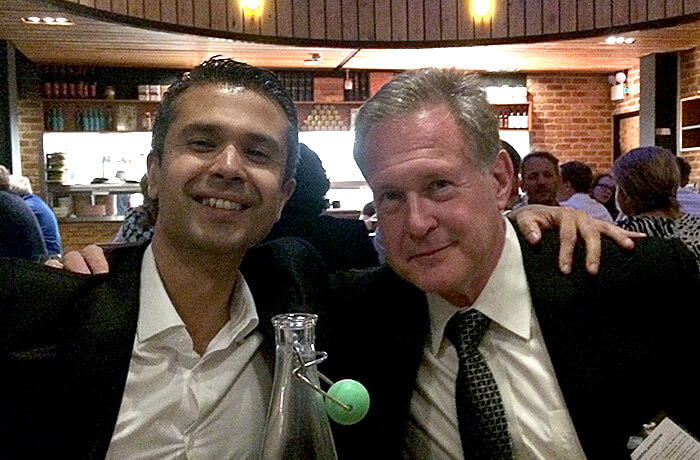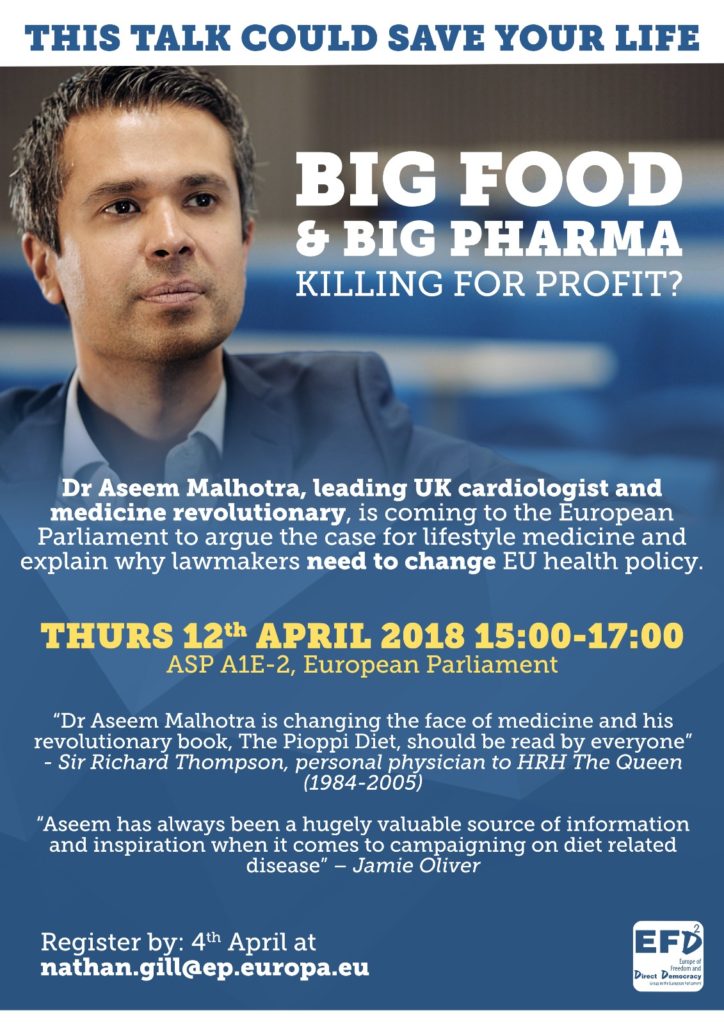Government guidelines that advise putting starchy carbohydrates such as bread, pasta, potatoes and rice at base of a recommended diet have are described by Dr. Aseem Malhotra as a “35 year fad that has driven obesity related illness with disastrous consequences for public health”.
By cutting sugar and starchy carbohydrates from his diet, Type 1 diabetic Nathan Gill, Member of the European Parliament (MEP) for Wales, has reduced insulin requirements by 50% and now urges Prime Minister, Theresa May, also a type 1 diabetic to do the same.
New data from diabetes.co.uk reveals that 30,000 type 1 diabetics have reduced insulin requirements by up to 80% simply by cutting out starchy carbohydrates.
MEP Nathan Gill was so astonished by the dramatic changes to his personal health after following eminent cardiologist Dr. Aseem Malhotra’s advice to follow a low carbohydrate high fat diet that he has written an open letter to the Prime Minister Theresa May calling for an urgent overhaul of dietary guidelines that promote low fat foods and advise putting starchy carbohydrates at the base of diet.
“Current government advice recommends that people put starchy carbohydrates at the base of their diet. These guidelines are absolutely wrong and have been a major contributor to the obesity crisis in the UK over the past three decades and the diabetes epidemic. I have now concluded that this advice and the promotion of “low fat” foods promoted in official government advice in 1983 has been a thirty five year diet fad that has replaced millennia of eating satiating and nutritious full fat whole foods with disastrous consequences for public health,” MEP Gill writes.
“After reading eminent British Consultant Cardiologist Dr. Aseem Malhotra’s evidence-based lifestyle medicine book, The Pioppi Diet and having met Dr. Malhotra in person, I cannot express how much my life has changed for the better by following his recommendations that pinpoint sugar consumption above 2 teaspoons a day per adult as potentially damaging to health. Current Government guidelines have allowed for ten times this recommended dietary allowance. My blood sugars are not only significantly more stable, but I have managed to reduce my insulin requirements by almost 50% which, I’m sure you will agree, is quite extraordinary,” MEP Gill tells the Prime Minister.
In the letter MEP Gill mentions that the harms of sugar consumption on health begin after consuming more than 2 teaspoons of sugar a day but research by Dr. Malhotra published in the BMJ in 2013 exposed that food labelling in the UK and Europe had in effect been advising the public to consume 22.5 teaspoons of sugar a day.
Following an investigation by the Sunday Times and Channel 4’s Dispatches it later emerged that several members of the Government’s Scientific Advisory Committee on Nutrition had financial ties to sugar manufacturers.
“Regulators, academic institutions, charities and organizations that have a responsibility to patients and should exhibit the highest standards of transparency and scientific integrity, instead of colluding with big pharmaceutical companies and the food and beverage industry for financial gain – to the severe detriment of public health. As a British citizen, a diabetic and as a politician I find this utterly unacceptable. Having personally improved my own health significantly by ignoring the official government dietary guidelines, which I have now clearly realized are not based on independent science, I urge you to do the same if you are not doing so already,” MEP Gill writes.
MEP Gill states “The history of tobacco control should have taught us that legislation to reduce the availability, affordability and acceptability of smoking had the biggest impact in reducing the consumption of cigarettes, and had this occurred decades earlier, when the first scientific studies linking smoking and lung cancer were published millions of premature deaths from lung cancer and heart disease could have been prevented. I also believe that we all have a role to play in helping to solve the current healthcare crisis. Politicians especially have the greatest impact to ensure that policies are evidence based and through legislation can protect children and the public from the excesses of industries whose primary motive is profit.”
MEP Gill emphasizes the urgency of the problem: “We are also simultaneously facing a crisis of an overmedicated population. In the UK, almost half of all adults are taking at least one prescription medication and 70% of those aged over 75 are on at least three. It is estimated that prescribed medication is the third most common cause of death after heart disease and cancer. With an ongoing funding crisis in the NHS, the future of our public health will necessarily need to shift the balance away from medicines that have at best marginal gains and come with side effects, to that of using lifestyle as a first line intervention. If all diabetic patients were to follow Dr. Malhotra’s recommendations in The Pioppi Diet, and also reduce their dependence on insulin by over 50%, “this would save the NHS hundreds of millions of pounds.”
On Thursday, April 12th, MEP Nathan Gill will host Dr. Malhotra in the European Parliament for a talk titled “Big Food and Big Pharma, Killing for Profit?” where Dr. Malhotra will make the case very clear for why the system needs reform, why lifestyle medicine must be at the forefront of improving global health, and what can be done to better inform the public.
The letter and advice to support the diet and lifestyle recommendations of the Pioppi Diet and ignore current dietary government guidelines has been backed by a number of prominent doctors, dietitians, nurses and columnist and broadcaster Jon Gaunt who has reversed his type 2 diabetes.
Sir Richard Thompson, Immediate Past President of the Royal College of Physicians and Personal Physician to Her Majesty The Queen, 1984-2005, said “Dr. Aseem Malhotra is changing the face of medicine and his revolutionary book, The Pioppi Diet should be read by everyone.”
Hanno Pijl, Professor of Diabetes at the University of Leiden, The Netherlands said “A steadily growing wealth of data supports the benefits of the Pioppi (Mediterranean) lifestyle for our health in general and for type 2 and for type 1 diabetes in particular. My experience as a clinician consistently confirms these data. While “Pioppi like” lifestyle measures can reverse type 2 diabetes in the majority of patients many people with type 1 benefit in terms of glucose control and medication use as well. Drugs are not the answer to lifestyle associated disease. Lifestyle is a choice up to a certain extent but is profoundly affected by the way we organize our community. Therefore our politicians bear a huge responsibility for the health of our future society.”
Arjun Panesar, CEO of Diabetes.co.uk said “Over 30,000 people with type 1 diabetes have joined the Low Carb Program since its launch in 2015. This is very much in line with the Pioppi Diet. Over 10% of the British type 1 diabetes population are members of the program, demonstrating the requirement of appropriate education and support. Data from patients with type 1 diabetes demonstrates reduction in insulin dependency by up to 80%, improvements in hypo and hyper awareness, reduction in hospital admissions, and greater perceived glucose control.”
Jon Gaunt, Columnist and Broadcaster said, “I was a Type 2 Diabetic for over 15 years but in less than 5 months I lost four stone and reversed my diabetes and came off all medications including blood pressure tablets. When my NHS Doctor asked me how I did this I replied, “by ignoring your food guidelines and instead following a Low Carb High fat diet like Dr. Aseem Malhotra suggests in his book The Pioppi Diet. It is clear from my research that the NHS must change its advice now and if it did millions more would lose weight, reverse their Type 2 and save the NHS Millions each year. Animal fat is not the enemy, sugar, processed food and Carbs are.”
Dr. Trudi Deaking PhD, Dietitian and Chief Executive Officer of X-Pert Health said, “Basing the diet on real foods whilst eliminating refined carbs and processed fats as in The Pioppi Diet can drive health benefits through prevention and management of long term conditions such as diabetes, obesity and heart disease. Going on a reduced calorie diet will damage your metabolism resulting in eventual weight gain. Achieve your health goals by eliminating snacks and eating non processed foods packed with nutrients. This simple advice can heal patients and save lives.”
Raquel Britzke, Registered Dietitian said, “In my own clinical experience a dietary pattern that restricts processed and refined carbohydrate foods whilst promoting whole fat foods as advised in The Pioppi Diet is most definitely the best approach to manage both type 1 and type 2 diabetes in addition to sustainable weight loss for those suffering with obesity. Current government dietary guidelines are flawed and need an urgent update. In particular advising diabetic patients to base their diet on carbohydrates such as pasta has had harmful consequences. It’s time to take a step back and look at the real world application of these recommendations.”
Sarah Ann Macklin, nutritionist and journalist said, “It’s clear from the rising epidemic of obesity ( which was set by the government to be reduced by 2021) and type 2 diabetes that current dietary guidelines are not working. Diets low in saturated fat and high in refined carbohydrates have an adverse effect on blood lipids and insulin levels. Addition attention to calorie counting is also misguiding our nation’s health. The Pioppi Diet which focuses on a diet rich in healthy fats such as omega 3, quality protein and whole fruit and vegetables supports all the scientific literature of combating obesity and reducing the risk of cardiovascular disease and diabetes when compared to the standard western diet.”
Lynda Sackett Clinical Research Nurse at the Countess of Chester Hospital said, “On September 12, 2017, my husband Mike suffered a massive heart attack after a particularly vigorous exercise session at the rowing club. He had joined the rowing club on the basis that he could burn more calories and lose weight. He had been overweight for most of his adult life following a diet that most of think of as healthy, based around starchy carbs, with a little of what you fancy! As a Research Nurse, I immediately started reading around the latest research on nutrition and this led me thankfully to Aseem Malhotra and the Pioppi Diet book. What immediately impressed me was the high level of evidence that supported this way of eating and we decided before leaving CCU that we would start following the principles of the diet. Mike’s angioplasty the night of his heart attack showed up areas of atherosclerosis which they said would need to be addressed at a later date by means of stenting or bypass depending on whether the area damaged by the heart attack had died or not. After 12 weeks of following the Pioppi Diet we discovered that he no longer needed this intervention and that he had managed to reverse a lot of the damage. I am convinced that his diet played a huge part in his recovery. We now eat a diet that is high in natural fats, vegetables and a moderate amount of protein and we are both at a healthy weight for the first time in many years. The main bonus for us has been that we both feel completely replete after meals and have no desire to snack or eat any sugary snacks. As a Research Nurse, I am very keen to become involved in research to help others reverse conditions such as metabolic syndrome and type 2 diabetes as it is now a subject I feel extremely passionate about having seen first-hand the huge benefits to health. Had my husband been on a low fat diet, he would have fallen off the proverbial wagon within a week. The sustainability of this way of life is what will help people to take charge of their own health without the need for suffering and deprivation.”
Richard Stantiford, Director of Take Heart Group, Cardiac Rehabilitation, Royal Sussex Hospital said, “We now have a small cohort of recovering cardiac patients with type 2 diabetes (many with Metabolic Syndrome) enthusiastically following the dietary principles outlined in The Pioppi Diet. They’re engaging in regular CV exercise but all have reported significant weight loss since the beginning of January 2018 when they switched from the current “Eat Well” guidelines to the Pioppi low carb Mediterranean Diet. As well as visible reduced abdominal fat, many have improved HbA1c, lowered triglycerides and seen modest improvements in HDL-C. The changes are remarkable and all of the patients feel so much better already and are extremely happy with their progress. Thanks Dr. Aseem Malhotra! We are now planning on encouraging more patients to adopt a “Pioppi” based approach to healthy eating.”
For all media and press enquiries please contact press officer Alexandra Phillips, at +44 7 888 66 789 3 or [email protected]
Visit Dr. Aseem Malhotra’s website here: http://doctoraseem.com/
Reference:
MEP Nathan Gill’s Open Letter






Recent Comments